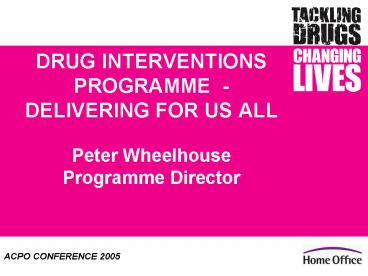DRUG INTERVENTIONS PROGRAMME DELIVERING FOR US ALL Peter Wheelhouse Programme Director
1 / 17
Title:
DRUG INTERVENTIONS PROGRAMME DELIVERING FOR US ALL Peter Wheelhouse Programme Director
Description:
DRUG INTERVENTIONS PROGRAMME - DELIVERING FOR US ALL. Peter Wheelhouse. Programme Director ... first and foremost a crime reduction programme ... –
Number of Views:37
Avg rating:3.0/5.0
Title: DRUG INTERVENTIONS PROGRAMME DELIVERING FOR US ALL Peter Wheelhouse Programme Director
1
DRUG INTERVENTIONS PROGRAMME -DELIVERING FOR US
ALL Peter WheelhouseProgramme Director
ACPO CONFERENCE 2005
2
Whats it all about
- first and foremost a crime reduction programme
- accessing offenders not in drug treatment and
historically very hard to reach - but in regular contact with Criminal Justice
System - make that contact drive engagement in treatment
- How? - combination of new law, changed working
practices, new investment and stronger focus on
partnership
3
Achievements
4
What have we done
- drug testing on charge in over 150 custody suites
96 BCUs - drug workers in all custody suites and many
courts - integrated teams in 70 areas
- Restriction on Bail power in CJA 2003 - now
operating in 44 areas - conditional cautioning CJA 2003
- funded 12 areas for integrated DIP and PPO
working - targeted interventions for children and YP
- new powers in 2005 Drugs Act testing on arrest
and required assessment - challenged some established concepts
- powerful new data including offending profiles
etc
5
Numbers into treatment via DIP are rising
6
..and drug-related crime down by 12 - falling
7
Police service are key partners
- frontend still absolutely crucial
- custody suite environment and attitudes determine
engagement - provisions such as Restriction on Bail need
pro-active police involvement - Drugs Act 2005 strengthens that role
- its a can-do culture
- police service has a wider view of drug activity
8
Lessons learned
9
What have we learned
- leadership/partnership is key in the field but
often broken - dont underestimate power of the professions
- workforce issues
- dont assume everyone knows what you want
- communication is part of the strategy not an
add on - data can be key to many things
- powerful source of change more to come!
10
The biggie
.2 years into programme becoming increasingly
apparent that long term success no just about
treatment. Is about the entirety of services and
interventions.why?
- 75 of prisoners drug misusers
- 80 have literacy skills at or below 11yrs
- 67 unemployed
- 39 homeless
- 20 times more likely to have been excluded from
schools - 59 of prisoners re-offend within 2 years
11
The future
12
DIP will not last forever
- needs to be part of how we all work
- offender/case management is the way forward
- not just for those in prison..
- or those on statutory supervision
- but before during and after sentences
- ..and even when not offending!
- future structures will be important
13
ways of working need constant evolution..
- focus rightly on offenders into treatment
- numbers significantly up
- but those not engaging most likely serious users
and high volume offenders - some volume crime stubbornly high
- need to use all tools available DIP, ASBOs,
recovered assets - to best effect
14
We can join up more
- Neighbourhood Policing central to way communities
can tackle drugs issues - local CJITs need to work with the Neighbourhood
Policing Teams - the most successful joint operations involve the
CJITs, Housing Providers, Local Authorities etc - treatment providers can help community based
enforcement - tackling dealers in isolation of users has
limited impact on communities
15
DIP works with other processes
- National Intelligence Model
- strategic and tactical products for tasking and
co-ordinating operational resources - problem profiles
- Level 1 enforcement activity should work 'hand in
glove' with CJIT's - DIP can improve level 2 activity
- manage the offender and not the offence look at
the bigger picture
16
A vision of the future
- more offenders into treatment
- exploit data, knowledge and intelligence we have
to make drugs policing more effective - drugs embedded from strategic force capability to
Neighbourhood Policing - the right long term structure
- more benefit to policing, offenders and most of
all.. - reassurance to our communities
17
Thank you































